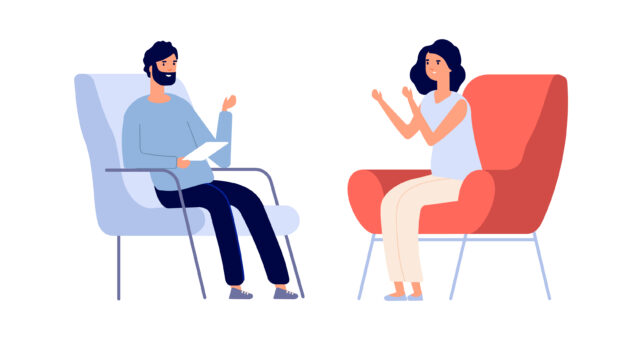Updated on 3/8/2023
Cognitive behavioral therapy (CBT) is a treatment for mental health that focuses on exploring relationships among a person’s thoughts, feelings and behaviors, usually facilitated individually or as a group by a mental health professional. It can be used in treating conditions such as post-traumatic stress disorder (PTSD), anxiety, depression, substance use, eating disorders and more. Introductory sessions with a therapist using cognitive behavioral therapy can help you determine if a therapist is the right fit for you.
When an individual struggles to function on a daily basis due to a mental health disorder, treatment is a crucial step to help them improve their quality of life. Treatment often involves a combination of medication and psychotherapy. One such therapy often used by trained mental health providers is cognitive behavioral therapy (CBT). Discover in this article what CBT is and how it’s applied in mental health treatment.
What is cognitive behavioral therapy?
The National Alliance on Mental Illness (NAMI) defines cognitive behavioral therapy (CBT) as a type of psychotherapy that “focuses on exploring relationships among a person’s thoughts, feelings and behaviors.” CBT can be facilitated individually or in a group, both settings involving a trained mental health provider to identify unhealthy or destructive thought patterns that may influence a person’s behaviors. Through CBT, individuals will learn how to take those negative or inaccurate thoughts and reframe or challenge those thoughts with something more realistic. Individuals will also learn to practice various techniques in relaxation, resilience, stress management, assertiveness and coping skills.
How does CBT work for those in mental health treatment?
CBT requires involvement of both the provider and the individual in treatment, and is often used in treating conditions such as post-traumatic stress disorder (PTSD), anxiety, depression, substance use, eating disorders and more. The process of CBT will differ depending on both the therapist’s approach and individual’s experiences. It typically begins with an introductory session for the therapist and patient to connect and build rapport, and for the therapist to learn details about the patient’s current situation and mental health history. Once goals and preferences are discussed, the therapist can create the most appropriate treatment plan for the patient, such as incorporating other types of psychotherapy and medication in addition to CBT techniques.
Typically, CBT begins with the therapist helping the patient identify circumstances or events that are troubling or traumatic for them, then helping them to become more aware of how those events affected their thoughts, feelings and beliefs. Additionally, CBT sessions focus on pinpointing recurring negative or inaccurate thoughts that may be exacerbating the patient’s mental health condition. The therapist will then provide the patient with tools and strategies to reframe or challenge these thoughts in an effort to ultimately change mood and behavior.
How can you find CBT providers?
It is important to ensure you’re receiving CBT from a mental health professional who is informed and qualified to provide the treatment. Discovery Mood & Anxiety Program has many therapists across the country who specialize in CBT. Psychology Today also provides a search engine that can be used to find a qualified CBT therapist in your area. Once an individual finds a therapist, they should meet for an introductory session to help determine if the provider is right for their needs. Just as all people have their own personalities and perspectives, mental health professionals come from different backgrounds and may have varying experience with the process of CBT than another provider. Feeling comfortable with a provider is crucial for finding success with CBT, and sometimes that may mean meeting with multiple providers before settling on one for long-term treatment.
Whether CBT is done on a one-on-one basis or in a group therapy session, it can be a viable way to help improve control over symptoms of a mental health condition so that a person can live a more fulfilling life.
If you or someone you love needs help managing a mental health disorder, Discovery Mood & Anxiety Program is here to help. We have treatment programs—from residential to outpatient—across the United States, and even virtually!
Madeline Radigan Langham is a registered dietitian who works with adolescents in mental health residential treatment. She is passionate about advocating for weight inclusivity and a non-diet approach to help people heal their relationships with food and their bodies. In her free time, she enjoys being outdoors and spending time on trails with her family. You can find more of Madeline’s thoughts and work at radnutrition.net or on Instagram at @mradnutrition.
